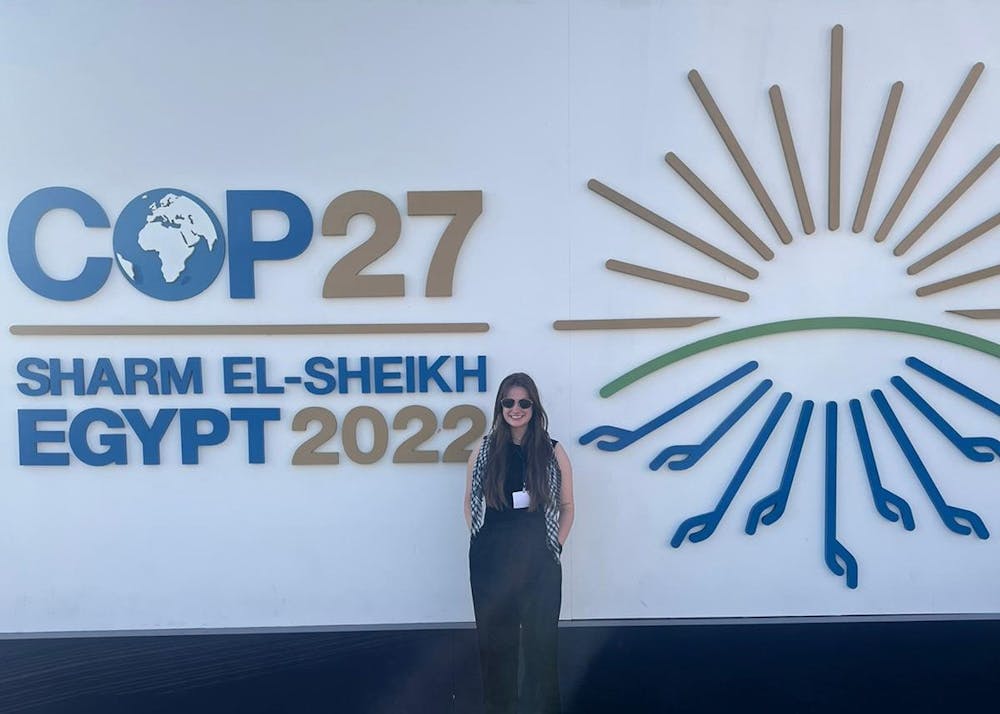Indiana University sent 18 students to the United Nations’ 27th annual Climate Change Conference of Parties, where they met with world leaders and experts to address issues of climate change.
The climate summit took place in Sharm El-Sheikh, Egypt, and ran from Nov. 6 – 18 this year. The event is an opportunity for world experts, leaders, researchers and students studying climate change to come together in taking action toward achieving the world’s collective climate goals.
IU students attended the summit as part of Jessica O’Reilly’s international climate government course. O’Reilly is an associate professor of international studies in the Hamilton Lugar School of Global and International Studies and leads IU’s delegation.
A limited number of students are chosen each year to attend the summit. Undergraduate and graduate students apply by submitting a research proposal for a project they would like to track during the summit. While students typically have experience and interest in environmental research, students from a variety of majors and backgrounds are invited to attend. This year’s delegation included students from the Hamilton Lugar School as well as the College of Arts and Sciences, the O’Neill School of Public and Environmental Affairs and the Kelley School of Business. After returning, they write a report they then present to the class.
Abby Potter is an international studies and Arabic major, with a minor in global media. Her research focuses on global health and development, and the research proposal she submitted in her application focused on climate change communication in Middle Eastern media outlets.
Related: [GUEST COLUMN: My experience at COP27: The climate conference for humanity]
Potter said she’s wanted to work with the United Nations since she was 12 years old, so getting the opportunity to attend the summit fulfilled a dream. During the summit, she spent time learning about Middle Eastern climate initiatives and what further action can be taken. Potter said she believes the Middle East has many green initiatives that appear to be helping climate change, but that do little to actually address it.
This year’s COP27 concluded with a breakthrough agreement to provide “loss and damage” funding for vulnerable countries negatively affected by climate disasters. Potter said industrialized countries that are responsible for the climate crisis need to support small island spaces that have not contributed as many emissions, but that are more heavily impacted by them. Climate change efforts should be bottom-up, she said, amplifying the voices and knowledge of everyday citizens and Indigenous people.
One of her favorite parts of the summit was learning about Indigenous efforts in climate change from youth activists.
“It’s such a beautiful moment for Indigenous people to stand up, have a voice and have people from around the world hear their voice,” she said. “It’s a big moment for students to learn from people from different countries, or even just delegates to network with each other and to encourage other governments to keep pursuing climate-friendly policies. Global collaboration is always a beautiful thing.”
Giuseppe Alkire, a master’s student, focused his research on the role of non-state global actors in global climate governance. He said being at the summit was electric.
“You get there, and you’ve been dreaming of doing something like this since you were a kid,” he said.
Alkire said the world has the technology and capacity to improve climate change conditions, but it can be difficult to get countries to coordinate. While every country has a right to economic development, he said, those countries most developed are historically the largest emitters of greenhouse gases.
Related: [GUEST COLUMN: My experience at COP27: COPs and nature]
Alkire also thinks local communities and Indigenous people don’t have enough representation in discussions around climate change. He would like to see local governments and minority groups be given the opportunity to participate in making decisions and developing initiatives.
Liv Davis is an international studies and geography major. Davis grew up in California, which she said gave her a nature-centric view of the world.
Davis’ research topic centered around utilizing ecological restoration and nature-based solutions in international climate governance. She strives to examine whether ecological restoration is used responsibly in climate agreements.
Attending the summit, she said, was the highest point in her undergraduate career. As someone who comes from a science background, the summit gave her further opportunities to combine her science knowledge with climate and environmental change.
The impacts of climate change are not felt equitably across the globe, Davis said, and are often felt most acutely in countries already experiencing political, economic or social instability. While small and developing countries are not contributing the highest amount of pollutants, they are often the ones hit hardest by the impacts.
“Not everyone is going to face these impacts equally,” Davis said. “Everyone’s going to face them at some regard, but the impact and the consequences of it — not equally.”
Although studying the effects of climate change on disadvantaged communities can be disheartening, COP27 reminded her there are other like-minded people, Davis said.
The trip was made possible by the Tobias Center for Innovation in International Development in the Hamilton Lugar School and the Kelley School's Center for International Business Education and Research.




